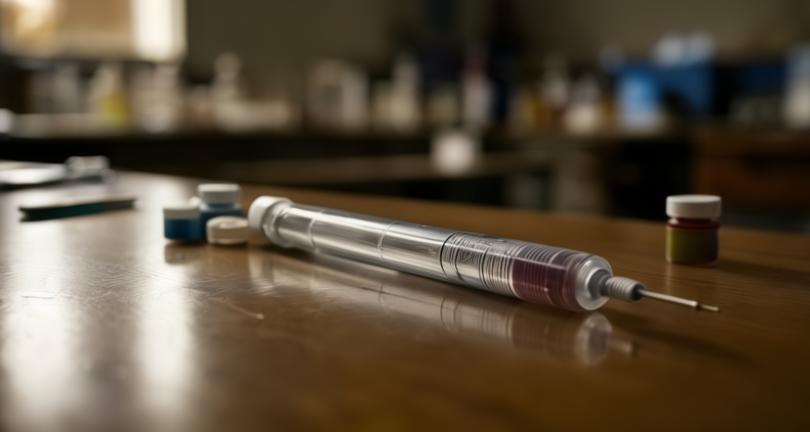JENI O’DOWD: Is needle spiking a yet undetected sinister trend or just a statistical rarity?
Is needle spiking at a bustling bar a yet undetected sinister trend or just a statistical rarity?

Imagine a bustling bar scene, the air filled with chatter and clinking glasses. Amid the throng, someone brushes past, and in that instant, an unexpected dizziness engulfs you.
Hallucinations dance before your eyes and your vision blurs. Confusion sets in — how can this be, with just one glass of wine?
Is this disconcerting scenario unfolding across clubs and pubs in Australia, with a sinister target: our teenagers?
Sign up to The Nightly's newsletters.
Get the first look at the digital newspaper, curated daily stories and breaking headlines delivered to your inbox.
By continuing you agree to our Terms and Privacy Policy.Do we need to brace ourselves for the grim reality of needle spiking, a malevolent crime that has crept from the shadows of Europe onto our shores, leaving unsuspecting victims in its wake?
It’s hard to say. One of the biggest challenges with this crime is it is often unreported, with teens, unused to drinking, not knowing exactly what has happened to them — and when they do, being too embarrassed to go to the police.
Needle spiking is the clandestine act of administering drugs to people without their consent through injection. It first gained attention in the UK in 2021 and since then, has been reported around the world, including Australia.
And here’s the second dilemma: if it is reported to the police, you would never know as there are no statistics surrounding needle spiking in NSW or Queensland, as there is no specific offence category for this crime.
The NSW Bureau of Crime Statistics and Research told The Nightly needle spiking would not be captured under the same category as a drink or food spiking, with the most relevant offence category being assault with a syringe or needle recorded as a weapon used.
“However, these incidents would not only cover (needle) spiking . . . but also other scenarios where a person is threatened or attacked with a syringe,” the spokesperson said.
So this means NSW Police can’t say if and when needle spiking is happening, a fact reinforced by a spokesperson telling The Nightly “they can’t comment on hearsay.”
The situation is similar in Queensland, despite stories from parents about needle spiking occurring at Schoolies on the Gold Coast.
Like NSW, there is no specific offence category for needle spiking.
“Local trend data, which may include spiking of a needle or by drink, would be recorded under a variety of crime offences . . . data does not allow for individual instances of spiking … to be recorded through these parameters and would be recorded under other crime classes,” a Queensland Police Service spokesperson said.
So is needle spiking just a huge urban myth? Despite the lack of official reports, stories are rife about it happening at Schoolies on the Gold Coast, both last year and in 2022.

One parent told The Nightly his son went to Schoolies on the Gold Coast last year, where he and his friends not only witnessed needle spiking but had to actively protect their female friends from being needle spiked.
He said one man, who was in his thirties, was caught in the act of needle spiking by the teens.
“The needle wasn’t even brought out, he poked it through his shirt. The boys approached him — they were in a crowded beer garden, ripped off his shirt and there were four to five needles tucked into his pants,” the parent said.
“On my son’s first night, someone in his group was needle spiked. One minute she was fine, the next she was hallucinating. They all knew she wasn’t drunk.
“They became very aware and very paranoid about needle spiking. After a few nights, they found more and more people reported getting spiked.
“One girl did go to the police who were controlling the venue the next night but they questioned her story, asking if she was just drunk.
“She definitely was not. Most 18-year-olds have some experience with alcohol at house parties, and know the difference between being drunk and being very high, a result of these drugs.”

The father said his son and their friends started to form a ring around the girls when they went into busy clubs or pubs, standing around them in a protective circle.
When asked if the Queensland Police were aware of teenagers complaining about needle spiking during Schoolies, a spokesperson told The Nightly: “The Queensland Police Service takes all reports of spiking seriously and investigates these on a case-by-case basis.
“Anyone who believes they have been spiked is encouraged to report the matter to police as soon as possible to ensure officers can obtain all relevant evidence in a timely manner.
“The QPS relies on the community to provide advice when incidents occur or have occurred.”
Dr Nicole Lee, a Professor at Curtin University’s National Drug Research Institute, says although there is little data on how often needle spiking happens, it is believed to be very rare.
“There have been only a few reports of needle spiking in Australia but none of them have been able to be confirmed,” she said.
Dr Lee said stories circulating about needle spiking just made women scared to go out or hyper-vigilant about something that, in reality, was unlikely to happen to them.
She said when going out, young people should make sure they are with trusted friends and look out for each other, especially if they are drinking.
“Teens attending Schoolies should make sure they go to venues with good reputations for safety. If something looks dodgy don’t go into it.
“And if anyone starts feeling woozy, or vomiting, they should let someone know and monitor symptoms. If they get a lot worse don’t be afraid to call an ambulance. It’s much better to call 000 and not need them than to have a terrible reaction with no one to help.”
Dr Lee said if anyone thought they had been needle spiked they should report it to the police, noting police cannot do anything, or keep track of any offences if they are not reported.
So, is needle spiking truly as rare as the statistics suggest? Or is it a lethal crime hidden within other crime categories?
It’s certainly acknowledged to be happening overseas, with the Department of Foreign Affairs and Trade last year updating its guidance for overseas travellers to include references to needle spiking, indicating its significance beyond mere statistical rarity.
I know one thing for certain: I will be talking with my three teenagers, their friends, and their parents, about this silent and insidious crime which appears to be hidden in plain sight.
